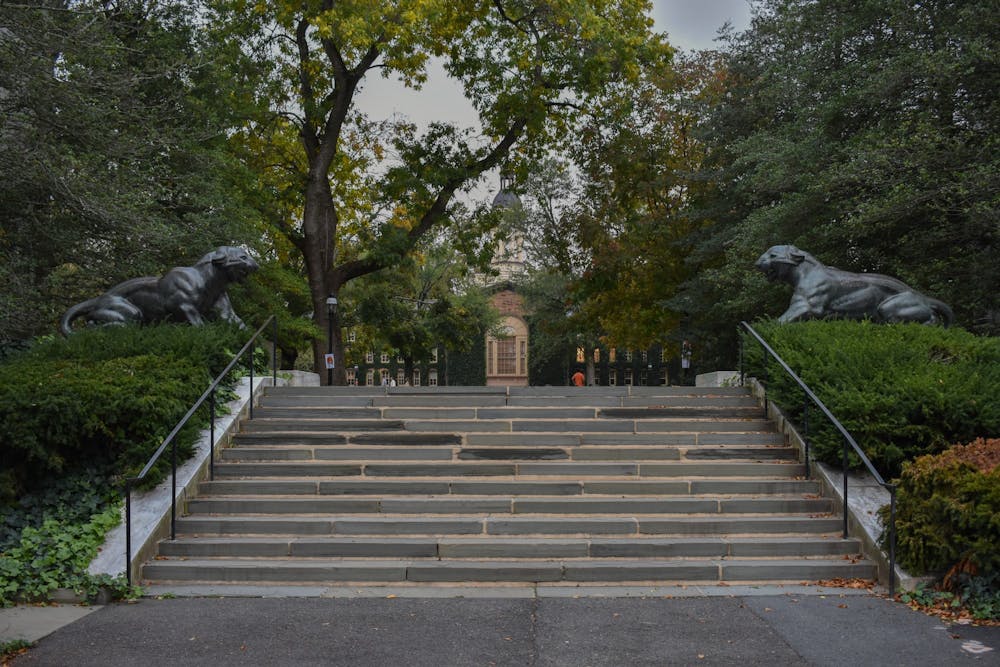Can I get one Locomotive for the number one university, for the 13th consecutive year, in the U.S. News and World Report’s annual Best National University Rankings?
This achievement, along with first-place rankings in the Wall Street Journal and Forbes’s own college rankings, is a source of much pride and Instagram story content for many Tigers. Though this exhibition of Princeton pride is seemingly inoffensive, it begs the question: why is being number one sacrosanct to so many Princetonians? And perhaps more important — should it be?
To address the latter question, college rankings have long been criticized for being too easily manipulated and inequitable. Even charitable analyses in support of these lists acknowledge their imprecision and the reality that first place does not mean perfection. What, then, does first place mean and why do people — particularly people at Princeton — care so much about being first?
Of the criteria considered for U.S. News’s 2024 rankings, those with the largest impact are based on: graduation and retention (42 percent), peer assessment (20 percent), and financial resources, debt, and earnings (18 percent). Even assuming the data used is fair and accurate, this methodology reflects an incredibly impersonal college experience. Nowhere is there mention of quality of food or living conditions, student satisfaction with coursework and extracurriculars, or any other metrics that would seemingly warrant first-place pride from students.
The reality is that there is no first place in student experience — not in a holistic way, at least. No university can be “the best” because the only people who know how great Princeton is, or is not, are the students at Princeton. Similarly, there is no way for anyone else to know how great, or not great, another university is unless they are a student at that university. The personal experiences that I, or any other Princetonian, have cannot be represented in any national college ranking.
Unfortunately, Princeton pride can be a privileged pride, a self-congratulatory pat on the back for attending a school with a lot of money and prestige and wanting more after graduation. The very criteria measured by U.S. News’s rankings are indicative of this.
Higher retention and graduation rates do not make a university inherently better. The measures themselves are inflexible and ignore the dynamic path many students are on by erasing degree-holding individuals who do not enter and exit college on a traditional cycle. Further, valuing these rates glorifies universities that either accept a lot of students of wealthier backgrounds — who are far less likely to drop out — or have incomprehensibly large endowments that grant generous financial aid packages — subsequently eliminating many financial burdens that would cause students at other universities to drop out. Princeton does both.
Peer assessment is defined by U.S. News as a “measure of how a school is regarded by top administrators at other institutions.” In other words, 20 percent of a school’s ranking is attributable to clout, largely determined by both pre-existing biases and the very rankings this peer assessment is supposed to inform. It is unsurprising, then, that already high ranked colleges perform well in this category, with prestige reinforcing itself in perpetuity.
Financial resources, or “average spending per student on instruction” is simply a measure of how wealthy a university is. With an $83,140 cost of attendance for the 2023–24 school year, it is to be expected that Princeton would indeed rank high. Though it is true that a more resourced school can provide opportunities, funding, and programming that is necessary for a better education and experience, that is not a guarantee. A focus on the spending itself, but not the quality of spending or result of that spending, is lazy and blindly rewards already wealthy colleges.
Further, a focus on post-grad earnings prioritizes wealth accumulation over receiving a successful and morally driven liberal arts education. It is true that social mobility is important for many students entering college, but the absence of any non-economic criteria of success implies the two cannot be simultaneously achieved, or that the latter is less important. That is especially worrisome given the University’s mission, but may suggest that the campus-wide celebration of these rankings are a manifestation of the career crisis at Princeton writ large.
The bad news is that the first-place ranking Princetonians are so proud of is plagued by the reality that these rankings serve to reward colleges for merely being a refuge for the rich and a jumping-off platform for the less privileged. The good news is that there is a lot to be proud of at Princeton that isn’t reducible to a U.S. News ranking, like Free Cake Wednesdays at Frist, selfies in East Pyne, and the shared experience of not knowing the words to the Locomotive.
Christofer Robles serves as the associate Community Opinion editor and Chair of the DEIB committee. He can be reached at cdrobles@princeton.edu.





